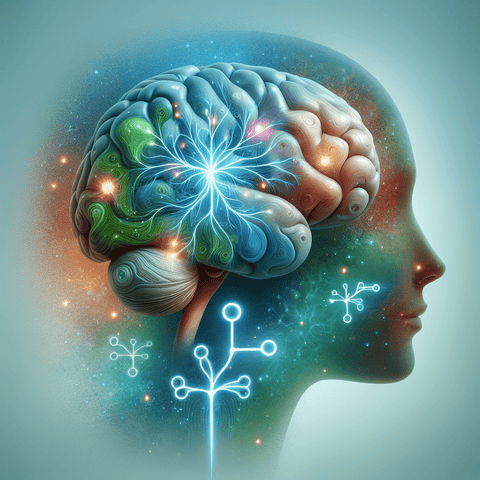Introduction: The Importance of B12 and Its Role in Mental Well-Being
Vitamin B12, also known as cobalamin, is a water-soluble vitamin that plays a critical role in many aspects of health — particularly within the realms of neurological and psychological functioning. It is essential for red blood cell formation, DNA synthesis, and notably, the maintenance of a healthy nervous system. A deficiency in vitamin B12 can lead to a host of physical and mental health complications, with many of its psychological symptoms being subtle at first, but potentially severe if left unaddressed.
Increasing awareness about the connection between nutrition and mental well-being has led to greater recognition of how essential vitamins affect brain health. Among these, vitamin B12 stands out due to its direct relationship with cognitive processes and emotional balance. Deficiencies can manifest psychologically long before physical symptoms show up, making early detection and intervention crucial.
This blog aims to explore the psychological symptoms associated with B12 deficiency in depth. We will examine how lacking this critical nutrient influences mood, cognitive function, and neurological stability, as well as highlight ways in which supplementation may help correct deficiencies. Whether you're interested in optimizing mental performance, maintaining emotional equilibrium, or supporting long-term brain health, understanding the role of B12 is essential.
For those considering nutritional supplementation as part of a mental wellness routine, recognizing the early warning signs of vitamin B12 deficiency could be the first step toward improved well-being and energy levels.
B12 Deficiency Symptoms Relevant to Nutritional Supplements
Recognizing the signs of B12 deficiency is critical, especially because symptoms often evolve gradually and are perceived as unrelated everyday ailments. Among the initial indicators are fatigue, light-headedness, and muscle weakness. However, multiple psychological symptoms can emerge concurrently, making dietary intake or supplementation consideration more urgent. These might include mood instability, chronic fatigue, sleep disturbances, irritability, and even apathy.
Psychologically, one may initially experience an inability to focus or reduced cognitive stamina. Over time, this can escalate into chronic brain fog and forgetfulness. Anxiety and depressive symptoms also commonly co-occur. Since these manifestations are frequently attributed to stress, hormonal changes, or life circumstances, B12 levels are often overlooked during initial evaluations of mental health complaints.
Supplements that improve B12 levels are a reliable option for individuals with absorption issues or those following plant-based diets, where natural sources of B12 (mainly animal-based) are limited. Cobalamin requires adequate stomach acid and intrinsic factor for absorption — both of which naturally decline with age or are diminished by gastrointestinal disorders such as Crohn’s disease, celiac disease, or atrophic gastritis.
Nutritional enhancement through high-quality B-vitamin complexes or methylcobalamin-focused supplements ensures that optimum levels are reached without relying solely on dietary changes. For individuals suffering from psychological signs due to a B12 deficiency, taking these supplements under medical guidance can offer marked improvement. Clinical data suggests that interventions correcting B12 deficiency have positive outcomes within weeks, improving energy, mood, and cognitive performance.
The cornerstone of successful intervention lies in early identification, ensuring that psychological symptoms are not mistaken for psychiatric conditions. Blood tests measuring serum B12, methylmalonic acid (MMA), homocysteine levels, and folate can help diagnose deficiencies accurately. In conclusion, observing subtle signs and acting promptly through appropriate supplementation methods can prevent enduring consequences and restore mental clarity.
Vitamin B12 Mental Health Effects: Recognizing Changes in Mood and Cognitive Function
Vitamin B12 is a co-factor in the synthesis of neurotransmitters such as serotonin and dopamine — both vital for mood regulation and emotional stability. When B12 levels are deficient, the production and balance of these brain chemicals may be disrupted, leading to noticeable changes in mood, emotional regulation, and overall mental health. This biochemical relationship is why individuals with low B12 often report feeling unusually sad, anxious, or irritable.
One of the most commonly reported psychological symptoms of B12 deficiency is depression. Unlike major depressive disorder originating from psychological or external stimuli alone, this type of depression stems from neurotransmitter imbalances—particularly the reduced synthesis of serotonin. Individuals may experience a general despondency, diminished interest in previously enjoyable activities, or chronic feelings of emptiness. These emotional shifts are not simply reactions to life events but are biological in origin and respond to physiological correction.
Equally troublesome are the irritability and fatigue associated with B12 deficiencies. In situations where emotional thresholds are normally manageable, individuals may find themselves snapping at loved ones or feeling overwhelmed. Fatigue exacerbates emotional sensitivity and can result in chronic stress or burnout. A cascade effect might then follow, where increasing emotional instability begins to affect social interactions, productivity, and physical health.
Research demonstrates that in older adults, especially those suffering from mild cognitive impairments, low B12 levels are strongly correlated with increased rates of depressive symptoms and accelerated mental decline. Given such findings, proper supplementation routines—including the use of complementary nutrients like vitamin D —can foster synergistic improvements in mental energy and mood stabilization.
Clinical practitioners often recommend checking B12 levels in patients presenting with depressive or anxiety disorders, especially when standard treatments show minimal effect. Once diagnosed, supplementation using well-absorbed forms such as methylcobalamin or hydroxocobalamin can offer significant relief. Often, individuals report perceptible improvements within three to six weeks depending on the severity of the depletion.
Understanding the mental health implications of vitamin B12 deficiency underlines the necessity of vigilant monitoring — both by medical professionals and individuals. Integrating usable forms of B12 through supplements ensures that mood-regulating functions are sustained, enhancing mental performance and emotional resilience over time.
Cobalamin Deficiency Neurological Signs: Uncovering Nerve-Related Symptoms
Beyond mood and emotional disturbances, one of the clearest physiological domains B12 deficiency affects is the nervous system. Vitamin B12 is essential for the formation and maintenance of the myelin sheath — a protective layer around nerves that ensures proper signal transmission. Damage to this layer can lead to a multitude of neurological symptoms, many of which are irreversible if not promptly addressed.
The earliest neurological symptoms associated with B12 deficiency are often subtle and may include paresthesia — a sensation of tingling or numbness in the hands and feet. These sensations occur due to demyelination, which interrupts normal neural conductivity. Other typical signs involve balance difficulties, a sense of instability or lightheadedness, and motor coordination problems. In severe cases, these symptoms escalate to ataxia and spasticity, especially in the elderly.
The severity of these neurological impairments depends on both the duration and magnitude of the deficiency. Even in the absence of anemia—a common hematological sign of B12 deficiency—neurological damage can occur. This is known in clinical literature as “subclinical B12 deficiency” and highlights the urgency of evaluating neurological signs even with normal hemoglobin counts.
Interestingly, research shows that neurological symptoms can persist despite supplementation if nerve damage has become advanced. However, early intervention through high-quality supplementation restores neuronal function in many cases. Comprehensive supplementation programs may also include omega-3 fatty acids like DHA and EPA to support neuroplasticity and cognitive regeneration.
Individuals belong to higher-risk groups such as vegans, bariatric surgery patients, or those with gastrointestinal disorders should be especially cautious, as B12 absorption is greatly reduced in their circumstances. Including bioavailable forms in their nutrient regimen, possibly through sublingual tablets or injections (as per medical guidance), is essential to preempt neurological deterioration.
In summary, tingling extremities, gait disturbances, and cognitive slowdown should never be dismissed as signs of aging or peripheral nerve syndromes alone. A comprehensive evaluation and early supplementation of cobalamin can limit neurological complications and restore optimal nerve function when acted upon timely.
B12 Deficiency Cognitive Issues: Understanding Memory and Concentration Problems
Cognitive function is one of the most sensitive indicators of B12 status. Low levels of vitamin B12 can lead to noticeable difficulties in memory retention, information processing, and mental clarity — commonly reported as “brain fog.” For many, these early cognitive signs appear years before more obvious indicators such as physical fatigue or anemia.
Vitamin B12 is fundamental for proper brain function as it supports the synthesis of myelin and crucial neurotransmitters and is involved in methylation processes. These roles are all interlinked with learning, recall, and executive functioning. A deficiency can impair attention span, slow reaction times, and reduce one's ability to absorb new information — impacts especially apparent in students or professionals in mentally demanding fields.
Cognitive impairment caused by B12 deficiency ranges from mild forgetfulness to severe disorientation and confusion. In adults over the age of 50, prolonged deficiency can mimic dementia-like symptoms and can progress to full-blown neurological syndromes if uncorrected. That said, unlike Alzheimer’s disease, B12-related cognitive decline is often reversible with proper treatment in its earlier phases.
Measuring B12 levels alongside supporting markers like homocysteine and MMA is critical in older adults presenting cognitive complaints. Supplementation tailored to medical needs — often involving methylated B12 — can restore cognitive health when delivered consistently. Combining B12 with co-factors like vitamin K2 or magnesium supports overall neurological regeneration and encourages better retention outcomes.
Researchers suggest that those engaging in demanding mental tasks or going through stress-induced cognitive fatigue may benefit from routine B12 assessments, especially if their diet is suboptimal. Mental output, concentration, and memory can significantly improve with balanced nutritional strategies that include essential B-vitamins.
As such, those struggling with comprehension difficulties, attention lapses, or short-term memory loss — even if not of an advanced age — should consider nutrient-based evaluations. Appropriate and timely intervention with proven-quality supplements can not only halt decline but may reverse symptoms in a matter of weeks to months.
B12-Related Mood Disturbances: Identifying Emotional and Behavioral Changes
Maintaining emotional balance is a finely tuned process involving numerous biological systems, neurotransmitters, and feedback loops — all of which are highly sensitive to nutritional status. Vitamin B12 plays a pivotal role in producing mood-regulating chemicals like dopamine, serotonin, and norepinephrine. A deficiency disrupts this production line, often leading to unexplained mood swings, chronic anxiety, and behavioral shifts.
Mood disturbances due to low B12 frequently include irritability, quick temper episodes, crying spells, low-grade anxiety, and even apathy. These are generally misinterpreted as personal emotional flaws or stress responses, delaying diagnosis and treatment. In children and adolescents, undetected B12 deficiency may also result in attention difficulties, academic underachievement, and emotional outbursts at school.
Numerous case studies have identified the reversal of depressive and anxiety symptoms upon administration of B12 injections or supplements, making this a vital area of exploration in functional psychiatry. For individuals already receiving treatment for mood disorders — including antidepressants or therapy — a review of nutritional markers such as B12 offers an often-missing piece of the puzzle. Enhancing mood often requires evaluating and remedying biochemical imbalances rooted in dietary deficiencies.
Supplementation with bioavailable forms of B12, especially in combination with antioxidants like vitamin C, supports the body’s efforts in regulating emotional health. Controlled clinical trials show synergy between antioxidant defense systems and methylation, leading to improvements in emotional stability and resilience to stress.
Behavioral shifts caused by B12 deficiency can be dramatic or subtle. In work contexts, it may translate to reduced productivity or increased absenteeism. At home, it might appear as emotional withdrawal or low patience thresholds with family. Fortunately, behavior improves when B12 levels are restored, often without needing more invasive psychiatric intervention.
To safeguard mental health, establishing dietary and supplemental sufficiency in B12 is imperative. Whether through fortified foods or orthomolecular supplementation, the key lies in early recognition and proactive self-care.



